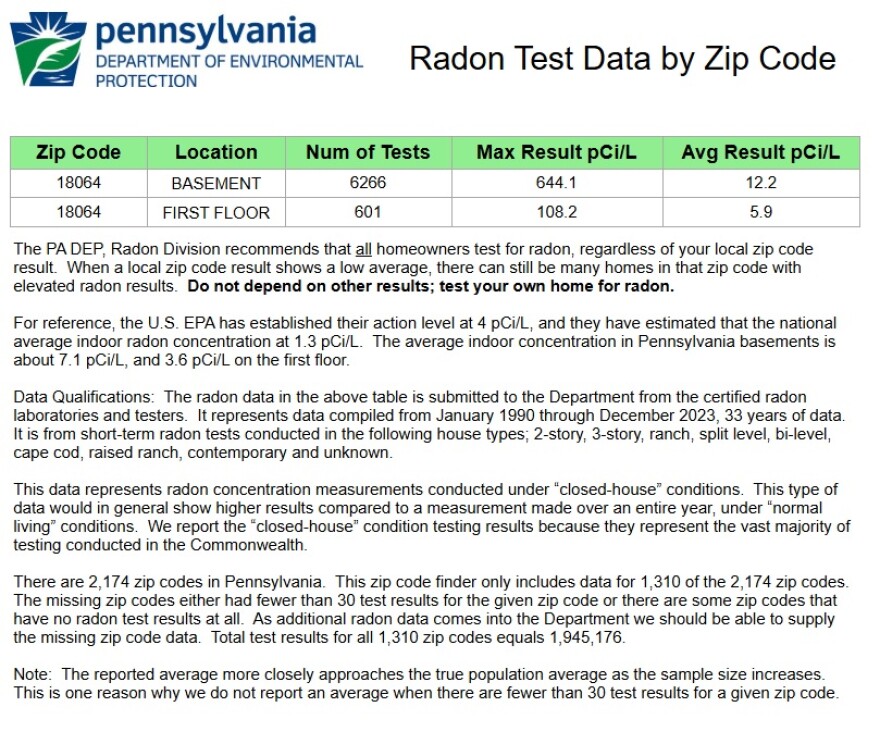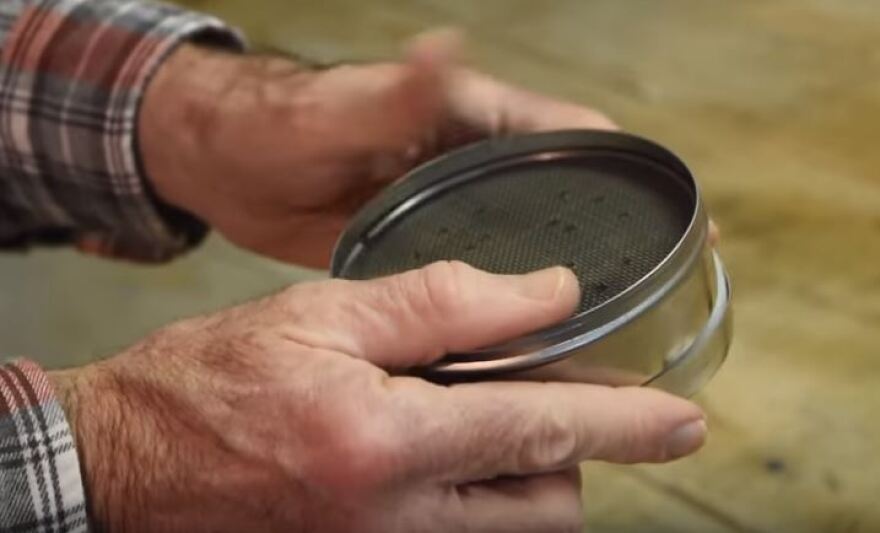ALLENTOWN, Pa. — Residents can’t see, taste or smell radon, a radioactive gas that can cause serious health problems — and those characteristics make it even more dangerous.
“Out of sight, out of mind,” said Chrysan Cronin, director and associate professor emerita of public health at Muhlenberg College.
“That's always one of the challenges with public health — getting people to actually understand what their risk is, not what their perceived risk is.
“But then, to get people to actually take action is always the biggest challenge in public health. That's our goal, to get people to take action.”
January is recognized as National Radon Action Month, and, in Pennsylvania, it’s also Radon Action Month.
"It's one of the only cancer-causing agents, actually, that we can eliminate from our indoor environment."Chrysan Cronin, director and associate professor emerita of public health at Muhlenberg College
With the record for highest levels of radon ever recorded held right here in the Lehigh Valley, public health officials are urging residents to stay informed of the risks, test and support legislative efforts to increase testing.
“It's one of the only cancer-causing agents, actually, that we can eliminate from our indoor environment,” Cronin said. “It's naturally occurring at very, very low levels that aren't harmful, but inside, you can test for it and then mitigate it.”
Radon in Valley homes, schools
Radon is a naturally occurring radioactive gas emitted from the ground, often entering homes or buildings through cracks in floors, basement walls, foundations and other openings.
Exposure to radon can cause lung cancer, even in those who don’t smoke.
“The EPA ranks indoor radon among the most serious environmental health problems facing us today,” according to the agency’s website.
“After smoking, it is the second leading cause of lung cancer in the United States, causing an estimated twenty-one thousand [21,000] lung cancer deaths a year.”
In Pennsylvania, 39.1% of radon test results were at or above the action level recommended by the Environmental Protect Agency, according to the American Lung Association’s “State of Lung Cancer” report.
Pennsylvania ranks 39th among all states, according to the report.
The EPA’s action level for radon is 4 pCi/L, or picoCuries per liter of air, and the agency recommends homeowners test every two years, especially in winter, when there is less ventilation.
The state Department of Environmental Protection publishes radon testing data online, organized by zip code. It turns out some of the most popular areas of the Valley have higher-than-acceptable radon readings.
Macungie’s 18062 ZIP code, which ranked 10th on Realtor.com’s 2024 Hottest ZIP Codes list, had an average result of 6.6 pCi/L for basement radon tests, according to DEP data.
The Allentown-Bethlehem-Easton, PA-NJ metro area is no stranger to the Top 10 list. Last year, the Nazareth area (18064) came in at No. 5, and Bethlehem (18017) landed at No. 6 in 2022 and (18018) at No. 12 in 2021.
That Nazareth ZIP code had an average result of 12.2 pCi/L for basement radon tests, while the Bethlehem ZIP codes averaged 6.7 and 5.8 pCi/L, respectively.

Homes aren’t the only buildings that can test high for radon. Schools can, too.
This month, Brian Yang, a Moravian Academy student, and Cronin published a study about radon levels in schools in JAMA, a peer-reviewed medical journal.
They looked at five school districts: Allentown Area, Bethlehem Area, Northampton, Northwestern Lehigh and Southern Lehigh.
They found 7,651 children, or 19.5%, of students attend public schools in ZIP codes where the average indoor residential basement radon levels exceeded 11.0 pCi/L. Of that group, 3,373, or 44.1%, were elementary school students.
“Despite its limitations, this study underscores the urgent need to conduct radon testing in schools and, if necessary, mitigate children’s exposure to school-based radon,” according to the report.
“Cumulative radiation exposure from radon in unmitigated school settings may have significant short- and long-term health effects on children because of the radiosensitivity of their developing organs and tissues.
“Moreover, children remaining in these school districts for their entire education could be exposed to up to 12 years of elevated radon.”
Radon testing
Last January, Cronin launched a campaign to educate and engage residents in radon testing.
As part of the initiative, 10 Lehigh and Northampton Transportation Association buses and bus shelters were outfitted with signs that include “RADON CAUSES LUNG CANCER” in bold lettering, as well as “Test your home. Save a life” with a symbol for radioactive material inside a home.
As a result of the effort, Cronin ended up mailing out about 500 free radon test kits, she said.
“Most of them were people who lived in the Lehigh Valley,” she said. She also talked about the project during a segment on radio station WHYY-FM.
“After that radio spot, I got people down in Philly and Bucks County, Montgomery County," she said. “All of that is important because you've got to get the word out, because people just don't know.”
Grant money from the U.S. Environmental Protection Agendy paid to mail the test kits, as well as mitigation work in five rental homes.
Over the summer, Cronin also launched a research project with a student, interviewing residents in Reading, Berks County, about what they know about radon.
A similar 2017 study in Allentown found ZIP codes where people predominantly identified as Hispanic, the primary language was Spanish, there was a lower socioeconomic status and education level, and renters were much less likely to have ever heard of radon than their counterparts in other ZIP codes.
“We did almost the same kind of interview in Reading, and we found very, very similar results,” Cronin said.
“We share all of our data with the state, so that they have an idea of what's going on in these little pockets in eastern Pennsylvania.”
State laws regarding radon
There are no state laws mandating radon testing in rental homes, apartments and public or commercial buildings.
“There are other states in the country that require landlords to test for radon, but Pennsylvania is not one of them,” she said.
That can prove particularly perilous for renters. If a test comes back with a high reading, landlords aren’t mandated to do anything.
“Our biggest chance of getting action taken [is] when it's a law, when you're required to do it. Then, you're more likely to pay attention to it and think it's legitimate.”Chrysan Cronin, director and associate professor emerita of public health at Muhlenberg College
There are, currently, only two commonwealth laws concerning radon, Cronin said — home sellers must disclose if they tested the property prior to sale, and radon mitigation companies must be certified by the state.
She’s hoping that changes, and there’s legislation that could make it happen.
Senate Bill 1328 would require radon testing in every school building across the state at least once every five years.
“Our biggest chance of getting action taken [is] when it's a law, when you're required to do it,” Cronin said. “Then, you're more likely to pay attention to it and think it's legitimate.”
Radon tests are often available at home improvement stories or through local, county and state programs. Go to the EPA's website for more information.


